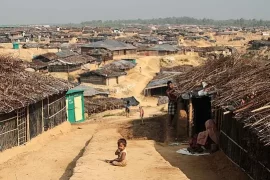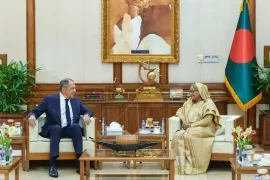Md. Fazle Rabby
 A large number of Rohingyas are living in camps in the border areas of Bangladesh building make-shift tents. The impacts of climate change are already conspicuous in Bangladesh and affect Bangladesh-UNHCR relations.
A large number of Rohingyas are living in camps in the border areas of Bangladesh building make-shift tents. The impacts of climate change are already conspicuous in Bangladesh and affect Bangladesh-UNHCR relations. The Rohingya refugee situation in Bangladesh is one of the most protracted in the world, with almost twenty years of continuous camp settlements in some areas in the most recent period. Regarding the Rohingya issue, Bangladesh is forced to face off with the UN agency UNHCR. The United Nations High Commissioner for Refugees (UNHCR) was founded as a subsidiary organ of the General Assembly by Resolution 319 (IV) of the United Nations General Assembly of December 1949. The United Nations High Commissioner for Refugees works as a specialised agency of the United Nations for refugee’s management worldwide. Bangladesh had relations with the UNHCR since its struggle for independence in 1971. In 1971 when Bangladesh fought with Pakistan for its legitimate independence more than 10 million civilians in Bangladesh were displaced from homes and became refugees in India. Bangladesh government recognised the noble support of UNHCR in 1971 and gave a tribute in March 2012. In that occasion, UNHCR urged Bangladesh to open its border to Rohingyas. UNHCR started to form international support and lobby in favour of its urge. Since then the well-poised Bangladesh-UNHCR relations has been in trouble.Officially UNHCR started its operation in the country in 1992 after Bangladesh had invited it for its logistic support to deal with massive flow of stateless Muslim Rakhines or so-called Rohingyas into territorial border of Bangladesh. UNHCR started its mission with the objective of managing these stateless Burmese people in temporary camps in the Bangladesh-Myanmar border and established supply chain of relief. Both the party started to work jointly to execute this noble task. Approximately 30,000 Rohingyas were registered living in two official refugee camps in Bangladesh, and more than 200,000 unregistered Rohingyas have been living in the surrounding towns and villages outside of the two camps. But this is not an exact figure. According to some estimations of different NGOs and news networks, more than 800,000 Rohingyas entered Bangladesh through trespassing. The facts and factors of these stateless Myanmar citizens are not that much strait and easy going. In August-November, 2012, European Union and United States started to back up UNHCR initiative very strongly. The hospitable people of Bangladesh wanted to give humanitarian assistance to Rohingyas. Still, socio-economic and socio-political critical reasons pushed them to raise voice against any number of Rohingyas’ entry in Bangladesh territory. So, the country has been listed in the bad book of the UNHCR. The stateless Rohingyas are the by force product of the fundamentalist regime of Myanmar. Internal political objectives of Myanmar provoked even its democratic parties and historically pacifist Buddhist monks into the same dirty and ugly ethnoreligious oppression. The daughter of Myanmar democracy Aung Sun Suu Kyi also chose the path of manipulating ethnoreligious extreme nationalist sentiment for dragging voters in her favour.
The case of Rohingya is a complicated one if someone considers it in Political Refugee Model. These stateless people are not recognised citizens and trapped in between refugees and asylum seekers. Rohingyas are not by product of civil war or riot. They became stateless by Myanmar’s those fascist leaders and policy makers who are populist Burmese in origin and part of ruling regime and military junta. Bangladesh’s highly dense population hardly had nominal resources to accept these unfortunate stateless people. For Bangladesh-UNHCR relations, Since 1974 Bangladesh has showed great tolerance through its pacifist approach towards Rohingyas. But it is no longer possible for Bangladesh to continue receiving Rohingyas. Another reason is that more than 10 million Bangladeshis will be internally displaced and stateless because of climate change.
In the 21st century, environmental degradation and climate change has emerged as a lethal threat to Bangladesh. It emerges as a major national security problem for the countries like Bangladesh. Bangladesh has been recognised as one of the most vulnerable countries to climate change (German watch Global Climate Risk Index (CRI)-2011 report.). A one-metre rise in sea level could, for instance, flood 17% of Bangladesh’s land area. A refugee, according to the international refugee convention (1951) does not specifically include someone displaced by a natural disaster or by climate change-related impacts. A refugee is defined as someone with: “A well-founded fear of persecution based for reasons of race, religion, nationality, membership of a particular social group or political opinion, is outside his country of nationality and is unable or owing to such fear, is unwilling to avail himself of the protection of that country.” Environmental and social scientists have emphasised the fact that climate change is likely to cause displacement of millions of people. Day by day our environment is continuously degrading. People are now facing deadly disasters and the number of disaster victims is also increasing rapidly. Bangladesh has urged global leaders and international organisations to come up with strategies for its survival and rehabilitation programme. Therefore, UNHCR needs to shift its policy concerning protracted refugee situations from ‘care and maintenance’ to ‘self-reliance’ and put emphasis on mobility and local integration. This will also be a step towards improving Bangladesh-UNHCR relations.
Relevant: WATER CRISIS IN BANGLADESH: CHALLENGES AND SOLUTIONS
The writer is a member of editorial team of Foreign Affairs Insights and Reviews magazine.







